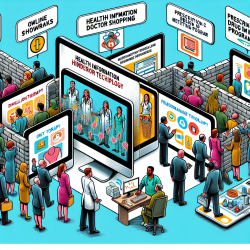As a Special Education Director, I am always on the lookout for innovative approaches that can enhance the quality of care we provide to our students. One such groundbreaking approach is highlighted in the research article titled, "Does an Internet-Based Emotion Regulation Intervention Provide Added Value for Acute Psychiatric Inpatient Care? Protocol for a Randomized Controlled Pilot Trial." This study delves into the feasibility and effectiveness of web-based emotion regulation interventions as an add-on to traditional acute psychiatric inpatient care.
The study is conducted at the University Hospital of Psychiatry and Psychotherapy in Bern, Switzerland. It aims to explore whether an internet-based intervention can complement standard treatment-as-usual (TAU) by improving emotion regulation skills and reducing symptom severity among patients. This is particularly relevant in the context of acute psychiatric inpatient care, where patients often experience severe emotional dysregulation.
Key Findings and Their Implications for Practitioners
The research is designed to investigate several key outcomes:
- Symptom Severity: The primary outcome measure is the change in general symptom severity, assessed using the Brief Symptom Inventory (BSI-18).
- Emotion Regulation: Secondary outcomes include the assessment of emotion regulation skills and difficulties using the Emotion Regulation Skills Questionnaire (SEK-27) and the Difficulties in Emotion Regulation Questionnaire (DERS).
- Usability and Satisfaction: The study also evaluates the usability of the intervention and patient satisfaction using the System Usability Scale (SUS) and the Client Satisfaction Questionnaire (CSQ-8).
The intervention, known as REMOTION, consists of several modules designed to improve emotional awareness, strategy selection, and implementation. These modules are delivered through a web-based platform, allowing patients to engage with the content at their own pace. The study also includes weekly reminders to encourage consistent use of the intervention.
Benefits and Challenges
Implementing internet-based interventions in an acute psychiatric inpatient setting offers several benefits:
- Patient Empowerment: Patients gain tools to manage their emotions, which can lead to improved self-efficacy and overall treatment outcomes.
- Accessibility: The intervention is accessible at any time, providing flexibility for patients to engage with the content during idle times.
- Complementary Treatment: The intervention serves as a valuable add-on to traditional face-to-face therapy, enhancing the overall treatment plan.
However, there are also challenges to consider:
- Technical Barriers: Issues such as lack of internet access or technical difficulties can hinder the effectiveness of the intervention.
- Patient Engagement: Patients in acute settings may struggle with motivation and concentration, affecting their engagement with the intervention.
- Integration with Existing Treatment: Coordinating the intervention with other treatment components (e.g., medication, psychotherapy) requires careful planning and communication among the care team.
Encouraging Further Research and Implementation
This pilot study provides valuable insights into the feasibility and potential benefits of internet-based emotion regulation interventions in acute psychiatric inpatient care. However, more research is needed to fully understand the long-term effects and to refine the intervention for broader application.
As practitioners, we should stay informed about such innovative approaches and consider how they can be integrated into our own practice. Attending conferences, reading publications, and participating in webinars can help us stay up-to-date with the latest research and best practices.
To read the original research paper, please follow this link: Does an Internet-Based Emotion Regulation Intervention Provide Added Value for Acute Psychiatric Inpatient Care? Protocol for a Randomized Controlled Pilot Trial.










